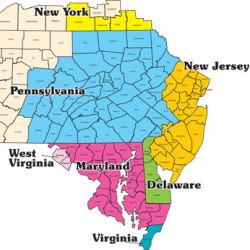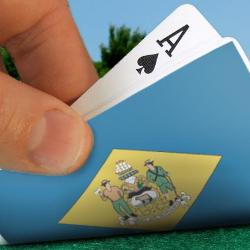Pa and NJ Partnership Could Boost iPoker Market

In 2013, the Garden State passed online gambling legislation in the hope of generating millions of dollars in annual revenues. While the online gambling market in New Jersey reached a record high in July of this year, online poker’s performance, on the other hand, has been well below projected rates; however, there’s the possibility of light at the end of the tunnel, but not from within New Jersey but from next door in Pennsylvania.
Online Poker Is Imminent
When Pennsylvania passed their most recent budget, a revenue line of $100 million from online gambling was included in the document. That means that all that’s standing between legalization in the Keystone State is the passing of a law to make it all official. A bill has already made it through the Pennsylvania State Senate, and there are high hopes that this fall the Assembly will follow suit.
Reaching Out Ahead of Time
Already, New Jersey gambling regulators are in talks with Pennsylvania over the possibility of forming an interstate compact with one another. If this happens, players from New Jersey gambling sites and those from sites licensed in Pennsylvania would be pooled together and be able to compete with one another at the virtual tables.
Why would this be beneficial to New Jersey?
The answer is simple–liquidity. In order for online poker sites to be successful, there needs to be a steady supply of players online to support all of the games on offer. So far, New Jersey sites have struggled to build up enough liquidity to make gaming at the virtual tables appealing as New Jersey has a population of just 8.9 million. Combine that with Pennsylvania’s larger population of 12.8 million, however, and you have more than double the number of potential players. If a deal could be worked out, New Jersey players would suddenly be able to play more games than before, as there would be more liquidity available.
Benefits Could Be Even Bigger
Industry analysts feel that an interstate online poker compact between New Jersey and Pennsylvania is pretty much a sure thing. With Pennsylvania now relying on casino gambling money as a part of their budget, they have even more incentive to pass online legislation and make things as profitable as possible for the state. The more money that online gambling sites generate from happy customers in an industry with satisfactory levels of liquidity, the more funds Pennsylvania will have for their coffers. Therefore, the deal with New Jersey just makes sense.
But it might not stop there.
Analysts also feel that Pennsylvania’s jump into the world of online gaming might inspire other states that have been on the fence to move forward. Specifically, Michigan, Florida and New York have been named as spots where legalization might occur rather quickly once Pennsylvania’s law is a done deal. It’s possible that one of these states might jump at the chance to form a three-way interstate compact, which would mean an even greater boost in liquidity, as all three have rather sizable populations.
NJ versus Pa Gambling Market
For years, New Jersey was the USA’s second biggest casino market, second only to Nevada. That all changed in 2012, when New Jersey’s annual revenues fell to around $3 billion, while Pennsylvania’s casino market rose to $3.16 billion.
New Jersey recorded an all-time revenue high of $5.2 billion in 2006, but with Pennsylvania having legalized casino gaming in 2004, the Garden State subsequently had to contend with an increased level of competition from its neighbor, as well as a national financial downturn. Last year, the gap between their casino markets widened further with Pennsylvania generating a record $3.17 billion in gross revenues, up 3% from the previous year, but New Jersey’s revenues falling by 6.5% to less than $2.6 billion.
New Jersey’s decline has continued despite legalizing online gambling in 2013, although the sector has undoubtedly helped the state mitigate some of its losses with the vertical reaching a record high of $17.4 million in July, up 38.6% year-on-year. While online gambling games have shown strong growth, the same cannot be said about online poker which continues to see its share of iGaming revenues eroded to July’s level of $2 million.
Despite the entry of PokerStars to New Jersey a few months back, the state’s online poker market is in desperate need of a liquidity boost, and taling about the prospect of a poker compact with Pennsylvania, John Pappas, the executive director of the Poker Players Alliance, stated:
“Pennsylvania is important because it would be another domino to fall. But it’s not just about them; it’s about whether then New York or Connecticut is next to go. Pennsylvania isn’t a savior, but it’s a good building block.”










